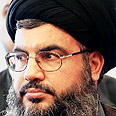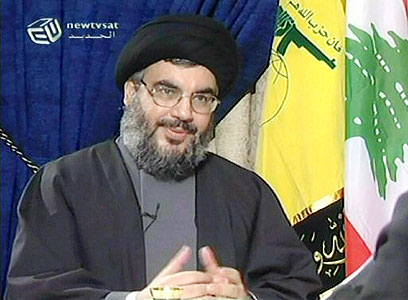
Lowering tone: Hassan Nasrallah
צילום: איי פי
Nasrallah: We won't be restrained for a long time
In first interview after Lebanon war to Lebanese station NTV, Hizbullah chief says he would not have kidnapped IDF soldiers had he known Israel would respond the way it did. 'Resistance will continue to be a tool for the army. There won't be a problem with UNIFIL so long as its mission won't be to disarm Hizbullah,' he says
Hizbullah leader Hassan Nasrallah said Monday that had he believed, even one percent, that a war would break out following the kidnapping of two IDF soldiers, the operation would never have been launched.
In an interview granted to Lebanese news network New TV, Nasrallah said in an almost apologetic tone that "we did not believe, even by one percent, that the captive operation would result in such a wide-scale war, as such a war did not take place in the history of wars. Had we known that the captive operation would result in such a war we would not have carried it out at all."

Hassan Nasrallah in interview (Photo: AFP)
Similar comments were made Nasrallah's deputy, who said that his organization was surprised by Israel's response.
In his first interview since the ceasefire, Nasrallah at times assumed an apologetic stance, unlike the boastful stance taken immediately after the operation.
At another point during the interview, Nasrallah corrected his own declarations and said that that a Hizbullah member who took part in the kidnap operation fell into IDF custody – something he flatly denied in the past.
"It could be that one of the participants in the operation has been taken prisoner. This needs a deep check because tho took part in the operation were youths who fought in front lines for an extended period," he said.
The Hizbullah leader said that recently contacts have been made to start negotiations over the issue, and that Italy was interested in taking part. He said the UN also expressed interest in being part of the negotiations, which will take place with the aid of Lebanese parliament Chairman Nabia Berri, who belongs to the Shiite sect and who is thought of as an associate of Hizbullah.
The Italian Foreign Ministry denied it was part of the prisoner exchange negotiations.
During the interview Nasrallah said that there was a possibility he could meet with UN Secretary General Kofi Annan, who will visit Beirut on Monday.
With that, a security problem for Nasrallah prevents him from holding such a meeting. During the interview he also denied the possibility that he would participate in the national dialogue in Lebanon which began a few months ago and froze during the war, due to concerns over criticism participants may direct against him.
Second round?
During the interview, Nasrallah said he did not expect a second round in the war with Israel, but in the same breath added that his organization was reserving the "right to resistance" as long as IDF soldiers continue to remain on Lebanese territory."I won't send calming messages to anyone," he said. Despite the remark, there was a lowering of tones compared to comments made in previous speeches, according to which his organization would continue to fight IDF soldiers, but would only cease firing Katyusha rockets at Israel in case of a ceasefire.
"The open war with Israel ended on August 14, but Israel is continuing its acts of provocations to drag us into the confrontation," said Nasrallah.
"If we respond to the provocations we'll be considered the party that violated the international agreement, something which might cause a meeting around a second decision, which president Bush is working for and which is tied to the disarmament of Hizbullah. We have been restrained and we will not be provoked, especially as Resolution 1701 gives Israel the right to defend itself – something we opposed."
Nasrallah complained that since the ceasefire, "there are attempts to enforce Israel's new conditions, such as the deployment of UNIFIL forces in Lebanon's airport, ports, and along the northern border with Syria."
He hastened to ad that "as long as there is occupation we reserve our right to resistance. Until now we displayed restraint and tolerance, but this does not mean that we will be patient for a long time. We reserve this right and we can realize it at any time."
"There won't be public displays of weapons in the south , except of in cases of preparations or funerals of martyrs," stressed Nasrallah.
"This is our policy – to refrain from displaying weapons. If the Lebanese army notices any gunman – it is it's natural right to expropriate the weapons," said Nasrallah.
Nasrallah's comments match Israeli beliefs that Hizbullah's political stance has been harmed following the war.










